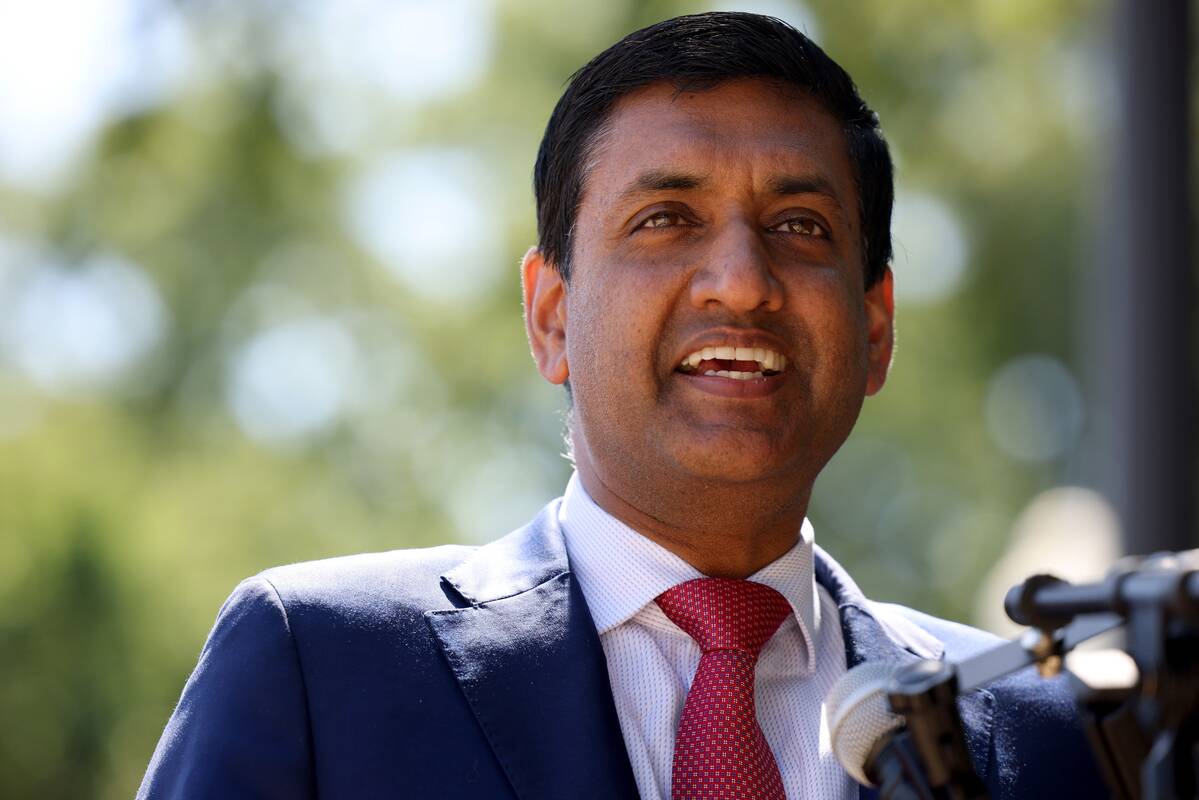| T.G.I.F. Technology 202 subscribers! Below: Calls for the IRS to drop its facial recognition push grow, and the FCC advances broadband "nutrition labels." First: | Ro Khanna says Congress has failed to regulate the tech industry. He's offering a path forward. |  Rep. Ro Khanna (D-Calif.) (Anna Moneymaker/Getty Images) | | | Silicon Valley Rep. Ro Khanna (D-Calif.) spares no punches about Congress' inability to regulate tech companies in his upcoming book, "Dignity in a Digital Age." "The dirty secret in Silicon Valley is that Congress will hold a hearing every few months, yell at a CEO or accuse them of theft to launch a viral clip, maybe even publish a blistering report — but then nothing changes and nothing happens," Khanna wrote in the book, set to be released Tuesday and reviewed in advance by The Technology 202. Khanna cites Congress' "technological illiteracy" as a big reason there's still no federal data privacy law or "well-crafted antitrust regulations." But the book isn't just a critique of Capitol Hill's approach to the tech sector. Khanna lays out a governmental and societal road map for how to deal with industry abuses, while also spreading Silicon Valley's wealth and opportunities around the country. Khanna outlines concrete legislative proposals he suggests Congress should consider to boost competition, expand consumers' privacy protections and address concerns about the dangers of social media, while weaving in scholarly references to the German philosopher Jürgen Habermas and American philosopher John Rawls. | | I caught up with Khanna over the phone Thursday to dig into those ideas and discuss what Congress is still missing about Silicon Valley, and vice versa. Here are the highlights: | He suggests an alternative but familiar plan on antitrust | | Khanna hasn't been shy about criticizing some of the proposals under consideration to revamp U.S. antitrust law. But his own ideas resonate with the approaches of congressional leaders, including Sen. Amy Klobuchar (D-Minn.) and Rep. David Cicilline (D-R.I.). Khanna's plans largely involve updating existing antitrust standards, rather than proposing new laws. He suggests broader interpretations that might catch more alleged anti-competitive behavior by tech giants like Facebook and Amazon. To that end, he floats imposing what's called an "abuse of dominance" standard, which "would prevent big tech from leveraging their market power to charge premiums, unfairly restrict competitors, or privilege their own products," he wrote. "There should be a sense of making sure that companies with large platforms aren't discriminating against sellers, against their competitors," he told me. It's similar conceptually to bills introduced by Klobuchar and Cicilline and under discussion in the European Union, though Khanna's proposal would be executed differently. They all seek to define what a dominant platform is and what conduct it shouldn't engage in. But Khanna also stressed the importance of balancing harms to innovation, a concern echoed by many of his California colleagues. He wrote that Congress needs to promote competition "without enacting legislation that is overbroad or destroys services that consumers want." In the book, he endorses requiring that dominant tech companies show that a proposed merger won't harm competition to get it approved, rather than tasking regulators with proving a deal will harm competition. That's another idea that's gaining steam on Capitol Hill. | He expands on the privacy protections in his 'Internet Bill of Rights' | | In 2018, House Speaker Nancy Pelosi (D-Calif.), then the minority leader, tasked Khanna with developing what became his "Internet Bill of Rights," a set of principles for what consumers should be afforded by companies when browsing the Internet. It included ideas that have become a common feature of privacy proposals on Capitol Hill, including requirements that companies get opt-in consent before collecting data from users and give consumers the right to delete their data or move it to another site. | | "I still believe opt-in consent will get us a significant way there," he told me Thursday. "But we need more than that." In the book, he expands on his initial ideas, suggesting that companies be required to act as fiduciaries when handling users' data, or, in other words, that it should be a duty to exercise care and loyalty. It's a concept that has gained popularity among Democratic lawmakers, including a group of 15 senators who introduced legislation based around that concept in 2018. But the idea hasn't picked up much, if any, momentum with Republicans. | He's got proposals for social media regulation, but with free speech at the center | | When Khanna discusses social media regulation, he's more hesitant than some of his Democratic colleagues to call for sweeping reforms. "I'm very conscious of the First Amendment, the limits of government and being an arbiter of truth, and I'm also sensitive to private censorship," Khanna told me. That's evident in his book. While other lawmakers have called for significant changes to Section 230, the embattled liability shield for digital services, Khanna has largely resisted them. In fact, he was one of the few lawmakers who voted against the only bill to amend Section 230 that's been signed into law, known as FOSTA-SESTA. But his book embraces a narrow proposal to change the law. He suggests making tech companies "liable for failing to remove content on their websites when a court finds that it incites violence or abuse." And he stresses in the book that it should largely only apply to imminent threats. He also suggests implementing more transparency requirements on social media companies, a push that has gained steam on Capitol Hill. In the book, he writes that "large social media companies should be required to file a [federal] report on how they control and amplify speech without having to reveal proprietary information." While he envisions narrow content regulations in Washington, he thinks the companies in Silicon Valley are in need of a major awakening about their role in society. He talks about creating a sense of "democratic patriotism" and instilling in engineers and executives that they have a role to play in preserving democracy and boosting democratic ideals. To that end, he makes the case for why social media companies should put less emphasis on maximizing profits and engagement, calling in the book for them to "not only optimize for attention with like and share buttons, but to also optimize for engagement with a wide range of perspectives." "It seems to be the balance right now on these platforms is there's too much … hate speech that is actually inciting violence, and that is making these platforms not open to actual exchange of ideas," he told me. Khanna isn't the first lawmaker on Capitol Hill to hope for this, though, and given the big cultural shift he's pining for, he likely won't be the last. | | |  | Our top tabs | | A nonpartisan watchdog group wants the IRS to halt its facial recognition plans |  People have already reported glitches in the system. (Samuel Corum/Bloomberg News) | | | Millions of Americans will soon need to send face scans to private contractor ID.me to access their Internal Revenue Service accounts, as my colleague Drew Harwell reported yesterday. The IRS has defended the technology, telling Drew that it will "create a better user experience" and that it "takes any reports of inequities in service seriously." But such a facial recognition program could be prone to error and facilitate surveillance, Project on Government Oversight (POGO) Executive Director Danielle Brian today told IRS Commissioner Charles Rettig in a letter obtained by The Technology 202. "The need to engage with our tax systems is one of the most universal elements of American society," Brian wrote. "Requiring that all individuals submit a facial recognition profile to access basic IRS services is an unacceptable cost to privacy and civil liberties, especially when government use of face recognition for surveillance is bound by essentially no federal rules or limits." Brian asked Rettig to "cease deployment of this technology"; consider less problematic alternatives; meet with technology, civil rights and civil liberties experts; and provide details about the IRS's plans and contract with ID.me. POGO isn't alone in its criticism of the plan. Algorithmic Justice League founder Joy Buolamwini called for federal and state governments to "immediately halt their use of ID.me for access to tax services and unemployment benefits, respectively." Fight For The Future, the American Civil Liberties Union and Surveillance Technology Oversight Project have also raised concerns about ID.me, Gizmodo's Mack DeGuerin reports. | The FCC unanimously voted to advance a plan requiring Internet providers to create easy-to-read labels |  The rule, which FCC Chairwoman Jessica Rosenworcel praised, is set to take effect in November. (Jonathan Newton/The Washington Post/Pool) | | | Under the Federal Communications Commission rules, broadband providers would be required to give customers information about prices, Internet speeds and other information in a digestible format. It comes after years of customer complaints about surprise charges and price increases, the Verge's Makena Kelly reports. The rules are slated to go into effect in November. They are based on voluntary labels that were launched in 2016 and modeled after food nutrition labels. | The FTC dinged Facebook and Instagram as it highlighted online scams |  Consumers most frequently named Instagram and Facebook as the places where the scams were advertised, the FTC said. (Jenny Kane/AP) | | | Reports of scams on social media more than doubled between 2020 and 2021, the Federal Trade Commission said. Consumers who reported social media scams most frequently listed Facebook and Instagram as the place where things they bought but never received were advertised, CNET's Andrew Blok reports. "Though purchases that never arrived made up the bulk of the scams, the most costly schemes involved bogus investment opportunities or situations where a con artist faked romantic interest before asking for money," Blok writes. A spokesperson for Facebook and Instagram parent Meta told CNET that the company puts "significant resources towards tackling this kind of fraud and abuse," and takes legal action against scammers when possible. | | |  | Rant and rave | | | Facebook parent Meta is changing the branding of its Oculus virtual reality headset in favor of language that mirrors its "Meta" name. It announced the move in a meme: | | Bloomberg News's Sarah Frier: | | Al Jazeera's Yaser Bishr: | | YouTuber and professional ultimate frisbee player Marques Brownlee: | | |  | Inside the industry | | | |  | Workforce report | | | |  | Agency scanner | | | |  | Privacy monitor | | | |  | Mentions | | - WhatsApp is launching its first U.S. marketing campaign, which is focusing on the benefits of the service and end-to-end encryption. The campaign will begin Sunday.
| | |  | Trending | | | |  | Daybook | | - The Brookings Institution hosts an event on ethical use of artificial intelligence on Monday at 11 a.m.
- Samuel A.A. Levine, the director of the FTC's Bureau of Consumer Protection, testifies at a Senate Commerce Committee consumer protection subcommittee hearing on coronavirus fraud and price gouging on Tuesday at 2:30 p.m.
- A Senate Appropriations Committee panel is set to hold a hearing on broadband infrastructure on Tuesday at 2:30 p.m.
- The Senate Commerce Committee considers the nominations of Alvaro Bedoya to be an FTC commissioner and Gigi Sohn to be an FCC commissioner on Wednesday at 10 a.m.
- The House Energy and Commerce Committee's consumer protection committee hosts a hearing on price gouging on Wednesday at 10:30 a.m.
- The House Transportation Committee's aviation subcommittee holds a hearing on 5G technology and aviation security on Thursday at 11 a.m.
| | |  | Before you log off | | | That's all for today — thank you so much for joining us! Make sure to tell others to subscribe to The Technology 202 here. Get in touch with tips, feedback or greetings on Twitter or email. | |










No comments:
Post a Comment